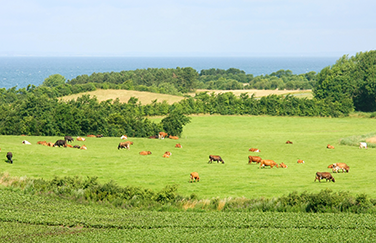In our series featuring sustainability leaders at Kemin EMENA, we speak with Thomas Henriksen, Sales Manager for Scandinavia. With over 25 years of experience in animal nutrition and genetics, Thomas joined Kemin a year ago, bringing a wealth of knowledge to the role. In this interview, he discusses Denmark’s pioneering carbon tax on food production, the potential for reducing emissions in the ruminant sector, and how Kemin’s holistic solutions are helping farmers become more efficient while improving sustainability and efficiency in farming.

“25 years ago, I trained as an animal nutritionist, specialising in ruminant nutrition and genetics at Copenhagen University. Throughout my career, I’ve worked within the animal husbandry and animal science industries, starting in genetics and spending many years in sales, particularly in the global selling of genetics. I joined Kemin approximately a year ago now. It’s quite exciting to be working with all farm animal species, having previously focused solely on pork production. Returning to the broader scope of animal nutrition at Kemin has been fascinating.
Denmark is a key focus in sustainability discussions in Europe, as it plays a central role in shaping sustainability efforts across the continent. In fact, the Danish Parliament has agreed to become the first country in the world to impose a carbon emission tax on food production. This means that all pork and dairy farmers will be taxed on livestock production. The finer details are still to be finalised, and the law is expected to be officially approved this October. After that, it will be implemented over a five-year period, during which each farmer will be taxed annually based on their production level and efforts to reduce their CO2 footprint at the farm level.
This development is significant for both the farming community and Kemin, as we have a broad portfolio of products that can help improve a farm's carbon footprint. As such, we’re all excited, though we’re also waiting to see how this new law will play out practically and how we can assist farmers in reaching their sustainability goals while still ensuring their economic performance.
At Kemin, our portfolio aligns closely with the growing focus on sustainability, which I find particularly unique and intriguing, especially given my background in nutrition. It is an exciting time in the ruminant sector, where the potential for impact seems the greatest. Much criticism is focused on this sector, yet it is also where we believe we can make the most significant difference with our solutions. From a personal perspective, the ruminant sector is also the most biologically interesting because when feeding ruminants, simply put, you’re not actually feeding the cow itself; you're feeding the microbes in the rumen. It's a complex biological system, and it's fascinating how we can interact with microbial processes in the rumen and animal metabolism to reduce carbon footprint, enhance cow health, and still ensure the farmer’s profitability.

Using our solutions means, for example, farmers can lower nitrogen emissions from individual animals, improving the farm's overall efficiency. This results in increased productivity, meaning that less input generates more output, thereby reducing the CO2 level per unit produced. It's all about higher efficiency through precise feeding and nutrition, leading to more sustainable food production, better animal health, and reduced reliance on antimicrobials. Our holistic approach at Kemin has clear benefits — we look at various aspects of the animal and farm, the bigger picture, so to speak.
I believe other European countries will follow Denmark’s lead in implementing similar policies. The Netherlands is already engaging in much debate on this, and I think other Scandinavian countries, like Sweden and Norway, will be watching closely, too. They’re likely to adopt similar measures in the future.
Denmark will undoubtedly make some mistakes along the way, but that will allow other countries to learn from us and adopt the best practices. New Zealand was an early mover on this issue but decided to pull back because of concerns about competitiveness. Going forward, I do believe that Western European countries and New Zealand are likely to lead these sustainability efforts, provided the economic consequences are manageable for farmers. At the end of the day, it’s about balancing sustainability with economic viability.
Increased demands often create a better playing field for the best farmers. Those who can adapt and meet these new requirements will likely become more competitive, while others may struggle. This happened in Denmark back in the 90s when we became the first country to ban antibiotic growth promoters (AGPs) in animal feed. Initially, it put Danish farmers at a competitive disadvantage. Still, farmers learned to manage without these inputs over time, which gave them a competitive edge when other countries were forced to follow suit.
I think the same could happen with this new carbon tax. Danish farmers may develop practices that give them an advantage once other countries adopt similar policies. The high-cost structure here means we have to be incredibly efficient. And now this new tax will add to that, pushing the best farmers to become even more efficient.
© Kemin Industries, Inc. and its group of companies 2026 all rights reserved. ® ™ Trademarks of Kemin Industries, Inc., USA
Certain statements may not be applicable in all geographical regions. Product labeling and associated claims may differ based upon government requirements.